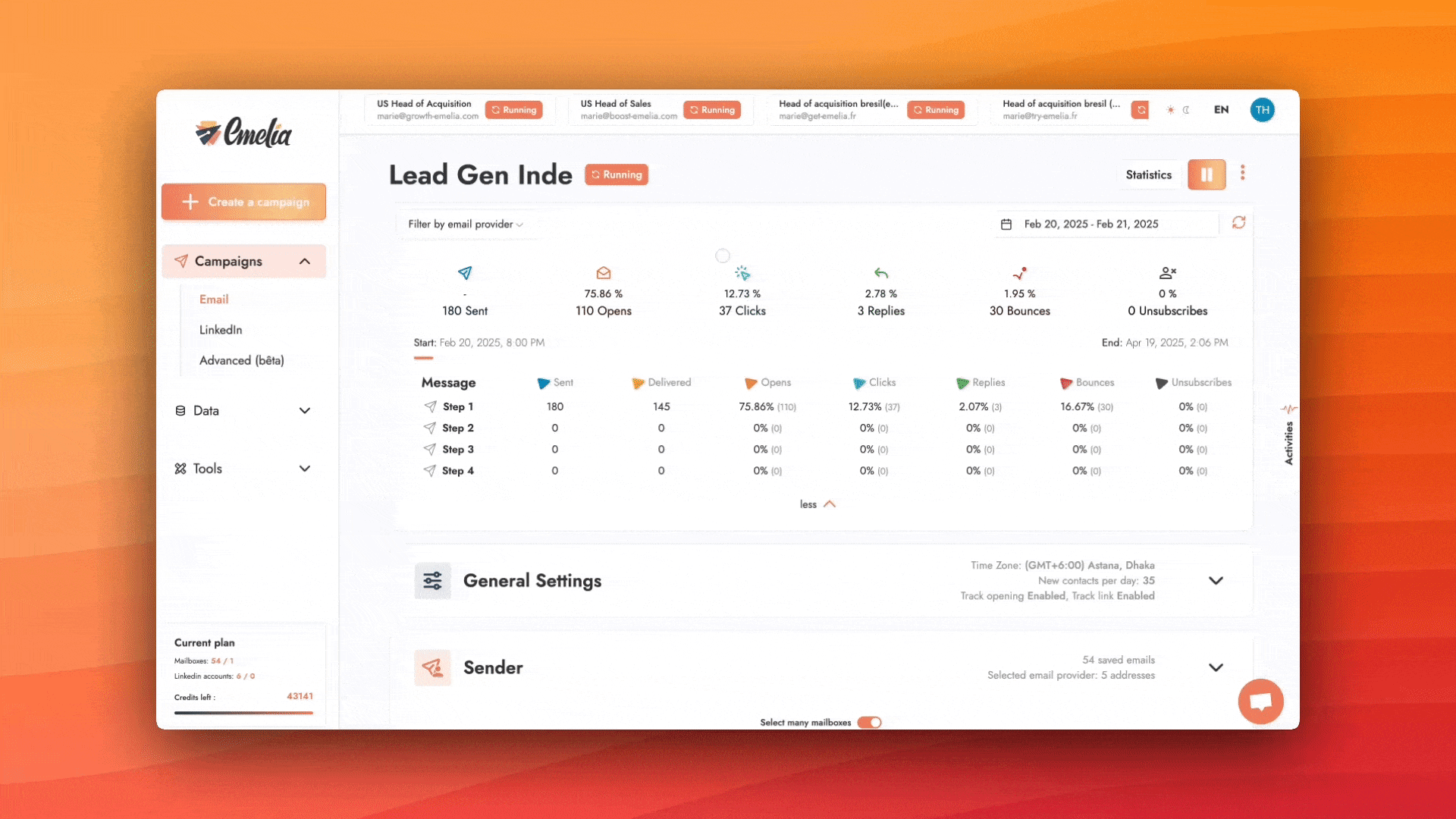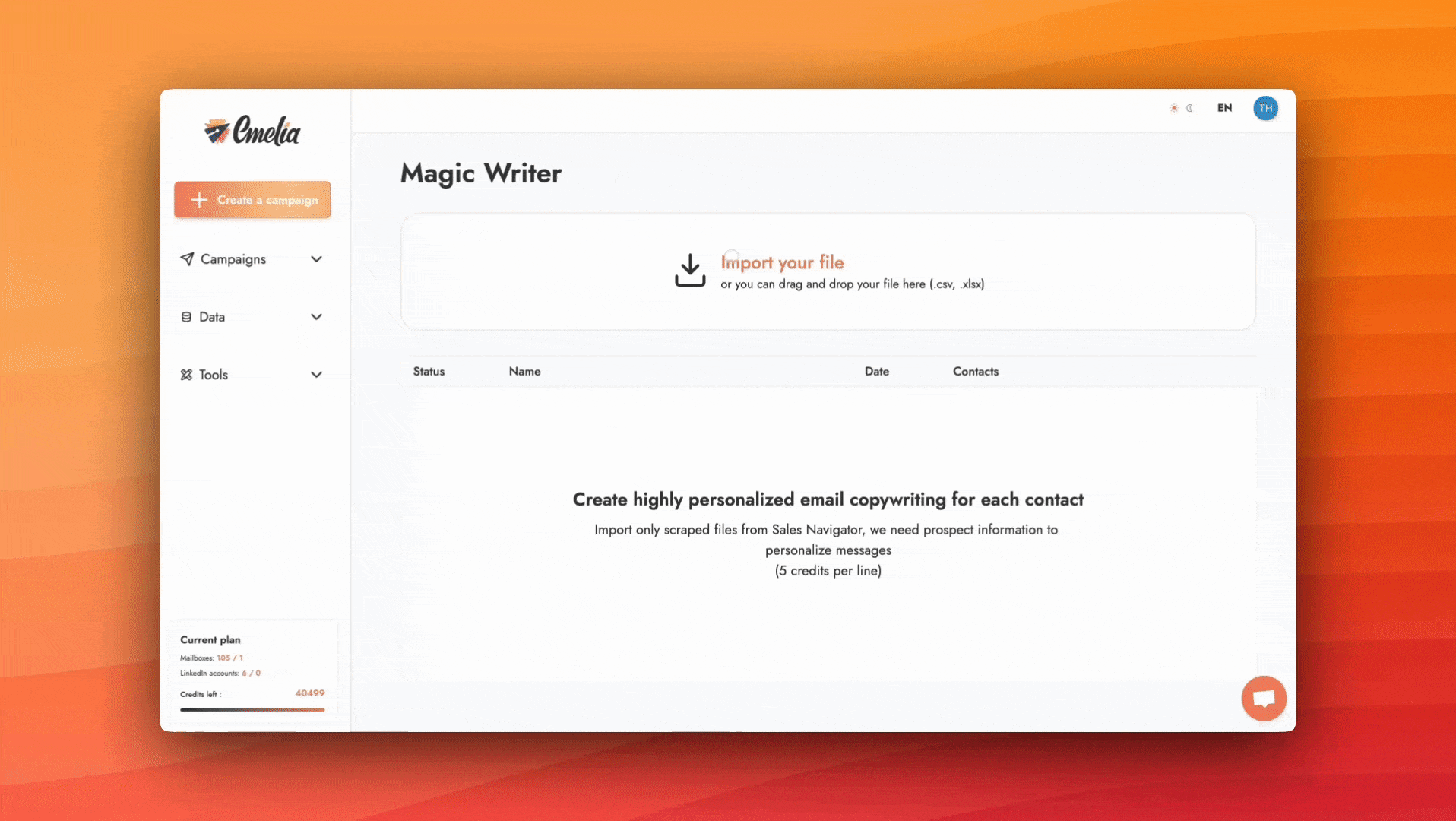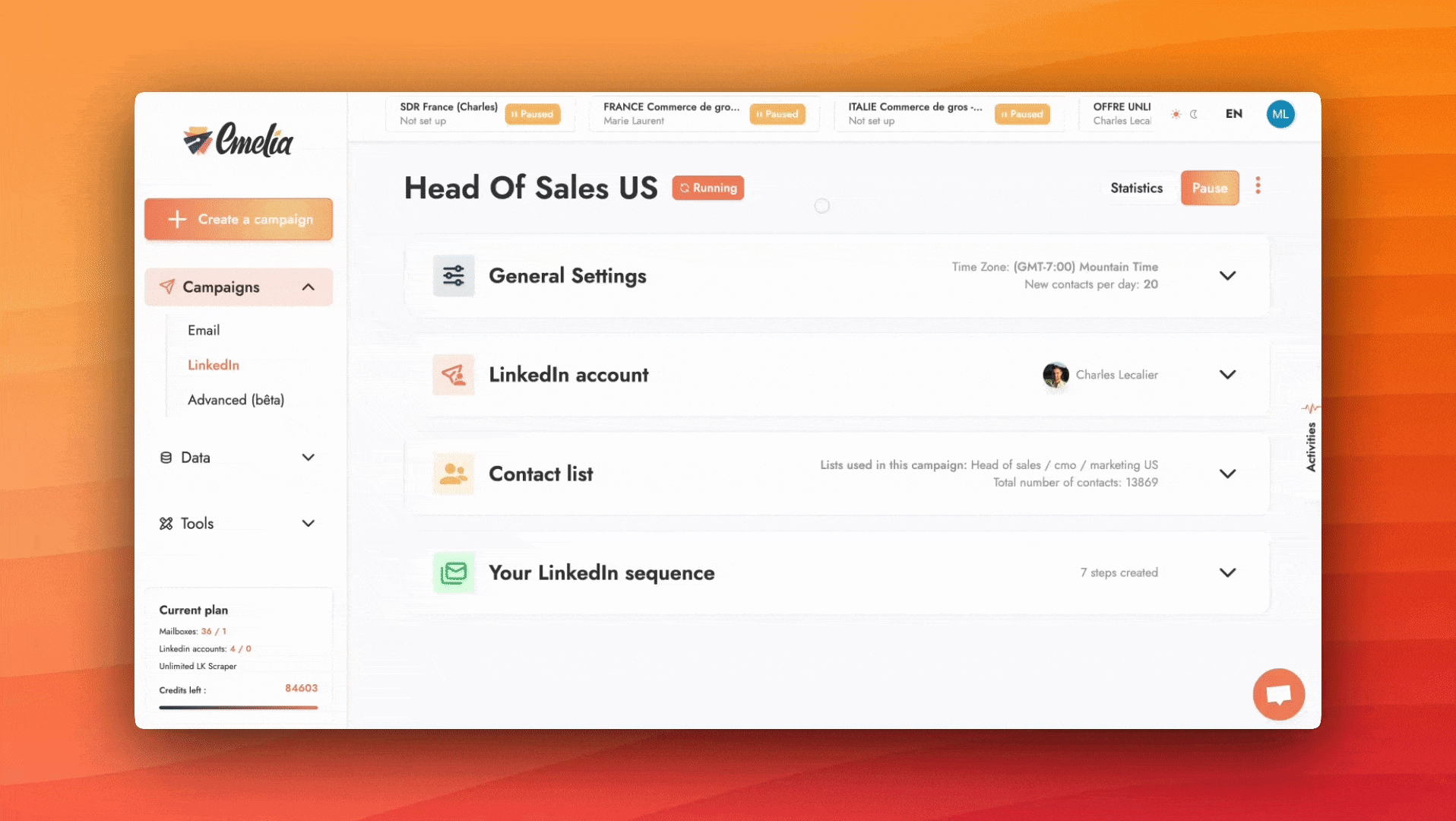
Back to hub
Blog
Marketing
B2B Prospecting
What is B2B marketing? Succeeding in Business-to-Business Commerce
Published on May 28, 2025Updated on Aug 3, 2025
B2B (business-to-business) marketing involves selling products or services to other companies, which is quite different from selling to individuals. This article provides a step-by-step guide to mastering the basics and winning strategies, even if you are just starting out. We begin by explaining what B2B marketing is and who the decision-makers are. Next, we break down the business buying process into three simple steps. Then, we explore practical techniques such as educational content, prospecting via LinkedIn and email, and search engine optimization (SEO). We also discuss upcoming trends for 2025, such as the use of video, and mistakes to avoid so you don't waste time. Finally, an FAQ answers common questions to clarify key points. Ready to turn your prospects into customers? Follow the guide!
1. What is B2B marketing? The basics
What makes B2B unique? B2B marketing is about promoting your products or services to businesses, not individuals. Unlike B2C (such as selling a smartphone to a consumer), B2B targets professionals with specific needs, such as software to manage their teams. Decisions are made by a group of decision-makers (bosses, financiers, technicians), which makes the process longer and based on logic (budget, efficiency) rather than emotion.
Who are the decision-makers?
Users: Those who will use your product (e.g., an employee testing software).
Financiers: They check whether it fits within the budget.
Bosses: They give the final go-ahead.
Buyers: They negotiate contracts. Each person has different priorities, so your message must speak to everyone.
2. The three steps to convincing a company
Companies go through three phases before making a purchase:
Problem identified: They realize they have an issue. Example: A company discovers that its customer service is too slow because of manual processes.
Search for solutions: They compare options through online research, demos, or reviews. Example: They read articles or watch videos about automation tools.
Final decision: They select the best solution and sign up. Example: After months of research, they choose a software program and install it.
Good to know: 80% of this process takes place before they contact you, and they consult an average of seven pieces of content (articles, videos) before making a decision.
3. B2B strategies that work
Tell useful stories with your content
Creating content (articles, videos, guides) is a powerful weapon for attracting businesses. Why? Because decision-makers look online for solutions to their problems.
Content ideas that work:
Blog articles: Explain how to solve a problem (e.g., “5 tips for managing your customers”).
White papers: Showcase your expertise with a detailed guide.
Case studies: Tell how you helped a similar customer.
Webinars: Offer an online session to answer their questions.
Real-world example: A cybersecurity company published a free guide on protecting SMEs. The result: 1,500 downloads in 3 months, 300 webinar participants, and 200 serious leads, 15% of which became customers.
Precise targeting with ABM
Account-based marketing (ABM) involves targeting a few key companies with tailored messages. For example, a company creates a video showing how its product fits into a specific factory. According to ITSMA, ABM yields 87% more than other methods.
Example: A manufacturer targeted 10 large customers with personalized videos. The result: 4 contracts signed in 6 months, a 40% success rate.
4. Emelia.io: the revolutionary platform to boost your B2B prospecting

In the demanding world of B2B marketing, where every interaction counts and personalization is key to standing out, Emelia.io is an essential solution for companies looking to optimize their prospecting and maximize their ROI.
Designed by French digital agency Bridgers in 2021, Emelia.io was born out of a real need: to reduce the exorbitant costs of cold emailing tools while offering a simple, powerful, and affordable platform for growth marketing teams and B2B companies.
Unlike other solutions that are often complex and overloaded with unnecessary features, Emelia.io focuses on an intuitive interface, advanced technologies, and a multi-channel approach that combines cold emails and LinkedIn prospecting to transform your campaigns into real growth drivers.
Why is Emelia.io a game-changer for B2B?
Emelia.io is revolutionizing B2B by simplifying the creation and management of personalized email campaigns. With its intuitive interface, businesses can automate targeted sequences in just a few clicks, effortlessly maximizing efficiency and engagement rates.
Ultra-targeted LinkedIn prospecting: With its LinkedIn Sales Navigator scraper, Emelia.io extracts thousands of qualified leads in seconds, automatically enriching the data with verified email addresses. Automated connection requests and personalized messages maintain a human touch, with response rates of up to 85% on LinkedIn.
Deliverability optimization: Emelia.io excels at managing sender reputation with email pre-warming protocols Warm'up, robust domain authentication, and real-time spam filter monitoring. The result? Your emails land in the inbox, not in spam, increasing the chances of engagement:
Data enrichment: The Email Finder and automatic enrichment tools fill in the gaps in your contact lists, allowing you to target specific decision-makers with up-to-date information about their company, industry, or recent activities.

Multi-channel sequences: Emelia.io synchronizes email and LinkedIn campaigns for a consistent approach, with behavioral triggers that send messages when prospects are most receptive. A growth marketing agency reported a 45% increase in qualified appointments in three months thanks to this integrated approach.
Detailed analytics: Track open rates, clicks, responses, and conversions in real time and use this data to refine your strategies. Emelia.io provides clear reports that turn every campaign into a learning opportunity.
Affordable pricing: Emelia.io's affordable pricing is revolutionizing B2B prospecting by making powerful tools accessible to everyone. Emelia.io offers exceptional value for money. With no commitment and no-expiry credits for Email Finder, it outperforms its competitors, whose costs can run into hundreds of dollars, democratizing access to prospecting.

And many other features such as Phone Finder (to find mobile phone numbers) and Magic Writer, which uses AI to write highly personalized email sequences.
Another success story comes from a growth marketing agency that, thanks to Emelia.io, has reduced its prospecting tool costs by 70% while doubling its volume of qualified leads. These results are backed by
responsive customer support, often cited as a differentiating factor, offering personalized advice to maximize performance.

A measurable impact in B2B: Emelia.io is used by more than 1,000 companies, from startups to SMEs, to streamline their business development processes. For example, a freelance web designer reported getting the best results among all the tools tested, without wasting time setting up their account.
Resources to take you further: Schedule a quick video call with Marie: https://zcal.co/marielaurent/demo-emelia
You can also check out the Emelia Hub for comprehensive guides on cold emailing, deliverability, and B2B campaign optimization.
For teams wishing to test the platform, a free 7-day trial is available, and an affiliate program offers partnership opportunities.
Why choose Emelia.io in 2025? In a B2B landscape where sales cycles are long and decision-makers are numerous, Emelia.io doesn't just automate: it humanizes prospecting at scale. By combining simplicity, power, and accessibility, it enables companies of all sizes to build authentic relationships, generate qualified leads, and boost their growth without breaking the bank. Whether you're a startup looking to scale quickly or an SME aiming to optimize your processes, Emelia.io is the strategic partner that will propel you to success.
5- LinkedIn + Email: The winning combo

Using LinkedIn and email together is a powerful strategy for contacting prospects. LinkedIn allows for personalized messages (85% response rate, compared to 30% for emails), while email is ideal for sending detailed information or scheduling automatic follow-ups.
Example: A consulting firm contacted 50 CEOs via LinkedIn with messages mentioning news about their company, followed by emails offering a free audit. The result: 20% responded, and 5 contracts were signed (€150,000 in revenue in 6 weeks).
When you combine LinkedIn prospecting with smart email sequences via a platform such as Emelia.io, you essentially create a multi-channel relationship-building machine.

6- Be visible on Google with SEO
SEO (search engine optimization) helps your content appear at the top of Google results. For example, an article on “best software for SMEs in 2025” attracts decision-makers who are actively searching.
Simple tips:
Use specific keywords (e.g., “inexpensive CRM tool”).
Create clear articles with catchy titles.
Add tools such as NeuronWriter to optimize your texts or Surfer SEO to optimize your content, or even Semrush.
Example: A software publisher published a guide on “choosing project management software.” Result: 5,000 visits per month and 300 leads in 6 months.
SURFER SEO

Surfer SEO is a content optimization tool that focuses on semantic analysis and on-page improvement. By studying the highest-ranking pages for a given keyword, it provides detailed recommendations on keyword density, text length, HTML tags, and LSI terms to include. Its clear and intuitive interface allows even novice users to quickly understand how to optimize their articles. Surfer SEO stands out for its ability to align content with search intent, increasing the chances of ranking on Google. It also offers features such as the Content Editor, which guides writers in real time, and an SEO audit to identify gaps in existing pages. Compatible with tools such as Google Docs and WordPress, it is ideal for marketers and writers looking for quick results. However, its cost may be a deterrent.
Neuron Writer

NeuronWriter is an affordable content optimization platform designed to help writers produce SEO-optimized text. Using artificial intelligence, it analyzes competitors and suggests LSI keywords, compelling titles, and an ideal structure to meet search engine expectations. Its interface is simple, with an editor that displays optimization scores in real time, making it easy to create high-performing content. NeuronWriter is particularly popular with freelancers and small businesses thanks to its competitive price and practical features, such as integration with Google Search Console. It also allows you to plan content strategies by identifying keyword opportunities. However, it may lack some of the in-depth analysis offered by more expensive tools. NeuronWriter is perfect for those just starting out or looking for an affordable alternative to Surfer SEO.
SEMRUSH

SEMrush is a comprehensive SEO suite known for its versatility and numerous features, including SEO Writing Assistant for optimizing content. This tool analyzes readability, tone, keywords, and search intent, offering suggestions to improve the quality and relevance of texts. Beyond content optimization, Semrush excels at keyword research, competitor analysis, ranking tracking, and ad campaign management. Its interface, while rich, may seem complex for beginners, but it is powerful for digital marketing professionals. Semrush also offers detailed reports and integrations with tools such as Google Analytics. Its high price makes it more suitable for businesses or agencies with substantial budgets. In short, Semrush is an essential choice for a comprehensive SEO strategy that goes far beyond simple writing.
These tools help writers create content that is aligned with search engine expectations while remaining engaging for readers. By adopting SEO and this software, B2B companies maximize their visibility and establish lasting credibility, which is essential in a context where purchasing decisions are carefully considered.
7- What will change for B2B in 2025
Videos everywhere: Short videos (demos, testimonials) are the most effective content. They capture attention and quickly explain your value. Interactive content: Quizzes or calculators (e.g., “Calculate your savings with our tool”) engage prospects. Employees as stars: Encourage your teams to share your content on LinkedIn to gain credibility. Ethical values: Show that your company is responsible (e.g., eco-friendly practices) to inspire trust.
8- Pitfalls to avoid so your campaigns don't fail
Talking too technically: Highlight the benefits (e.g., “save time” rather than “50 features”).
Forgetting to follow up: 60% of prospects need 5 or more contacts. Follow up with them!
Messages that are too generic: Personalize with specific information (e.g., mention a recent project of the prospect).
Ignoring blocked emails: Make sure your emails are arriving in the inbox by using tools to test deliverability.
Frequently asked questions about B2B marketing

What is the difference between B2B and B2C marketing?
B2B targets businesses with formal decision-making processes involving multiple stakeholders, long sales cycles, and a focus on ROI. B2C targets individual consumers, with decisions that are often quick and emotional, such as an impulse purchase via an Instagram ad.
How long does it take to see results in B2B marketing?
Initial results (leads, engagement) typically appear within 3-6 months with strategies such as content or SEO. Significant ROI, such as signed contracts, often takes 6-12 months, depending on the length of the sales cycle.
What is the most effective channel for B2B marketing in 2025? LinkedIn and email are a powerful combination, especially with tools like Emelia.io that automate multi-channel prospecting. LinkedIn excels at personalized messages (85% response rate), while email allows for detailed sequences and high volume.
What budget should you allocate to a B2B strategy?
Companies allocate an average of 2 to 12% of their revenue to B2B marketing, with 17% dedicated to content and 19% to advertising, according to Salesforce (2024). SMEs can start with affordable tools such as NeuronWriter for SEO or Emelia.io for prospecting.
What are the key metrics to track in B2B?
Volume and quality of leads generated
Conversion rate (lead to customer)
Customer acquisition cost (CAC)
Customer lifetime value (CLV)
Return on investment (ROI) of campaigns Track these metrics via platforms such as Salesforce or Emelia.io dashboards for email/LinkedIn campaigns.
How can you manage long sales cycles in B2B?
Maintain engagement with educational content (white papers, webinars) and automated follow-ups. For example, personalized email sequences, configured with tools such as Emelia.io, nurture prospects without being intrusive.
What are the pitfalls to avoid in B2B cold emailing?
Generic messages: personalize with specific data (e.g., company news).
Poor deliverability: use warm-up protocols and domain authentication.
Insufficient follow-up: 60% of leads require 5+ contacts. Platforms such as Emelia.io optimize these aspects with A/B testing and anti-spam tracking.
Conclusion:
B2B marketing in 2025 requires a balance between technology (AI, automation) and human authenticity. By combining strategies such as educational content, ABM, SEO, and tools such as Emelia.io, Surfer SEO, or SEMrush, you can generate qualified leads and accelerate your growth. Start by understanding your buyers, aligning your sales/marketing teams, and measuring your results rigorously. With consistent execution and data-driven adjustments, you'll be ready to dominate the B2B landscape.

Clear, transparent prices without hidden fees
No commitment, prices to help you increase your prospecting.
Credits(optional)
You don't need credits if you just want to send emails or do actions on LinkedIn
May use it for :
Find Emails
AI Action
Phone Finder
Verify Emails
€19per month
1,000
5,000
10,000
50,000
100,000
1,000 Emails found
1,000 AI Actions
20 Number
4,000 Verify
€19per month
Discover other articles that might interest you !
See all articlesB2B Prospecting
Published on Jun 26, 2025
Clearbit vs Cognism: Common Features and Differences
 Niels Co-founder
Niels Co-founderRead more
B2B Prospecting
Published on Jun 30, 2025
Zopto vs Waalaxy: Comparison of LinkedIn automation tools
 Niels Co-founder
Niels Co-founderRead more
Software
Published on Jul 6, 2025
Lead411 vs Lusha vs Emelia: The Ultimate Showdown Between B2B Prospecting Tools
 Mathieu Co-founder
Mathieu Co-founderRead more
Software
Published on Jun 24, 2025
PhantomBuster vs Waalaxy: B2B Automation to Dominate Prospecting in 2025
 Niels Co-founder
Niels Co-founderRead more
Software
Published on Jul 6, 2025
Kaspr vs ZoomInfo vs Emelia: Who Will Dominate B2B Prospecting in 2025?
 Niels Co-founder
Niels Co-founderRead more
Software
Published on Jun 30, 2025
Snov.io vs Waalaxy Comparison For B2B Prospecting
 Mathieu Co-founder
Mathieu Co-founderRead more
Made with ❤ for Growth Marketers by Growth Marketers
Copyright © 2026 Emelia All Rights Reserved
